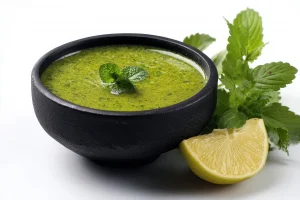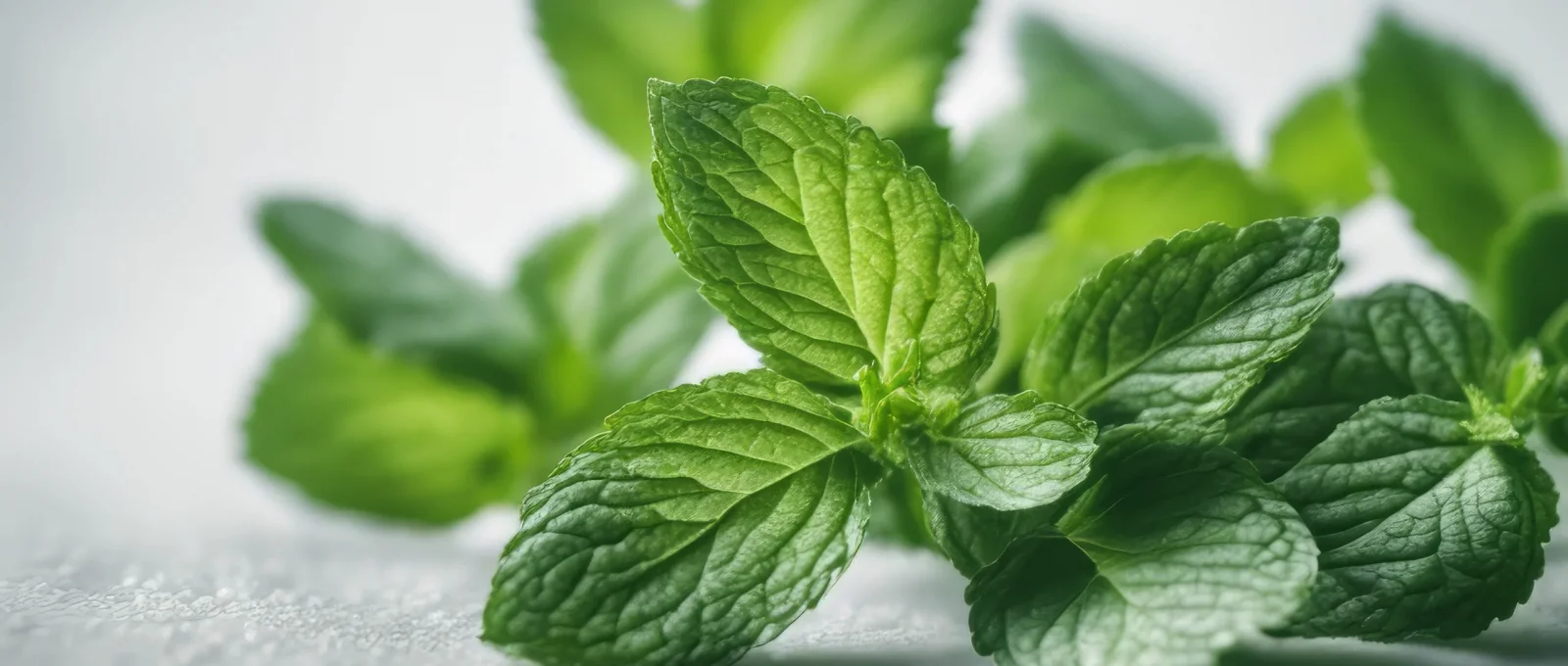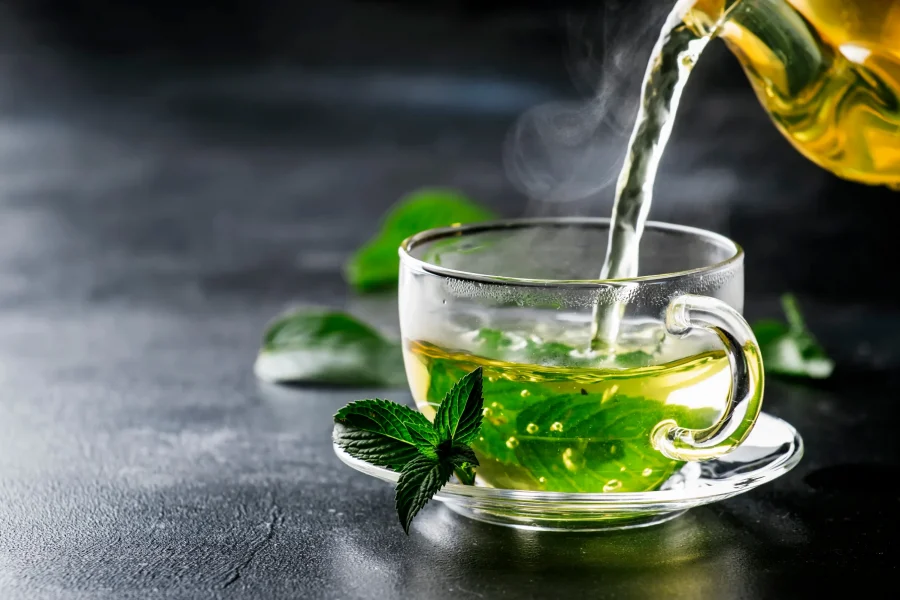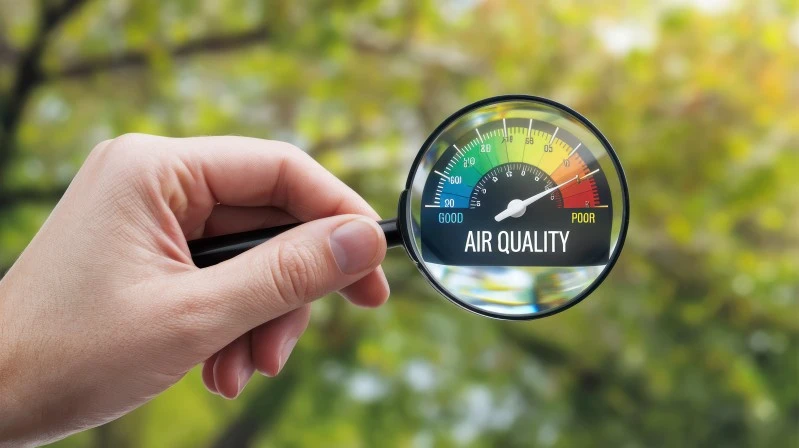Mint leaves- pudina in many Indian kitchens are more than a garnish. This cool, aromatic herb brightens chutneys, raitas, teas, salads, and infused water, but the benefits of mint leaves go far beyond flavour. Peppermint and spearmint are the most common varieties.
Peppermint (Mentha × piperita) delivers a stronger menthol “cool,” while spearmint (Mentha spicata) is gentler and sweeter – useful when choosing recipes or home remedies. In this guide, you’ll learn the most practical benefits of mint leaves, safety tips, and easy ways to add mint to everyday meals.
Values are approximate and can vary by variety and season.
| Nutrient (per 100 g, raw) | Spearmint | Peppermint |
| Calories | 44 kcal | 70 kcal |
| Carbohydrate | 8.4 g | 14.9 g |
| Fiber | 6.8 g | 8.0 g |
| Protein | 3.3 g | 3.8 g |
| Total Fat | 0.73 g | 0.94 g |
| Vitamin C | 13.3 mg (≈15% DV) | 31.8 mg (≈35% DV) |
| Calcium | 199 mg (≈15–20% DV) | 243 mg (≈19% DV) |
| Iron | 11.9 mg (≈66% DV) | 5.1 mg (≈28% DV) |
| Potassium | 458 mg (≈10–13% DV) | 569 mg (≈12% DV) |
Mint is a nutrient-dense add-on to your meals. Small amounts layered into meals cannot only enhance flavour but also lighten heavy dishes, and adds fibre, vitamin C, minerals like iron and calcium, and distinctive essential oils (especially menthol and rosmarinic acid).
Quick summary:
- Mint adds fibre, vitamin C, and key minerals in tiny calories.
- Spearmint is a lot milder than peppermint which is cooler as it contains more menthol
Use little, but use often—consistency compounds benefits.
Helps Ease Irritable Bowel Syndrome (IBS)
Among the standout benefits of mint leaves is digestive comfort. Peppermint’s menthol may relax smooth muscles in the gut, helping reduce spasms, gas, and bloating. Many adults with IBS use enteric-coated peppermint oil capsules under medical guidance; fresh mint in food or tea offers a gentler option for day-to-day support.
Quick summary:
- Start with fresh mint in raita/tea; it’s easy on the stomach.
- If considering peppermint oil capsules, consult your clinician first.
Supports Relief from Indigestion

A warm mint tea after rich meals is a classic way to enjoy the benefits of mint leaves. Mint can help food move more comfortably through the stomach and reduce that “too-full” feeling. Pair it with carminative spices like cumin (jeera) or ajwain in raita, chaas, or chaat. If you’re prone to acid reflux, you should stick to milder preparations with mint or opt for spearmint.
Boosts Brain Health and Cognitive Function
Looking for a clean mid-day lift? The aroma and polyphenols behind the benefits of mint leaves can promote alertness and a clearer head.
Keep mint-citrus water at your desk, or add a handful to green smoothies with spinach and lemon. Repeated small exposures (aroma + food) can support focus without caffeine jitters.
Provides Comfort for Breastfeeding Pain
Did you know, diluted peppermint water or gel might help soothe nipple discomfort and reduce cracks in early breastfeeding. This is an important but often overlooked benefit of mint leaves.
But remember: Never apply undiluted essential oils to skin, and always check with a lactation consultant or clinician for safe, evidence-based use.
May Help Relieve Cold and Flu Symptoms
During sniffle season, hot mint tea feels opening and soothing. Menthol can activate “cool” receptors in nasal passages, creating a sensation of easier breathing.
Pair mint with ginger or tulsi; add some honey for adults. Use this as supportive care alongside rest and fluids—it’s not a cure, but it’s comforting.
Freshens Breath Naturally
Breath freshness is one of the most popular benefits of mint leaves. Chew a few leaves, sip mint tea, or use a sugar-free mint rinse to quickly mask odour. For lasting results, pair mint with brushing, flossing, tongue cleaning, and dental check-ups. Persistent halitosis deserves evaluation.
Easy to add to your diet

You’ll notice the everyday benefits of mint leaves when they’re a habit:
- Blend: Mint–spinach smoothie with cucumber and lemon.
- Sprinkle: Chopped mint over fruit bowls, grilled fish, or chana chaat.
- Steep: Mint-ginger tea after meals.
- Whizz: Mint–coriander chutney with cumin and lemon.
- Infuse: Prepare a jug of lemon-mint water and keep it in the fridge
- Fold: Finely chopped mint into raita, hummus, or quinoa-paneer salads.
- Freeze: Mint-yogurt pops for a lighter dessert.
You can keep a small bunch of mint leaves handy in the fridge or grow them on your windowsill for instant availability.
Conclusion – Key Takeaways on the Benefits of Mint Leaves
Used consistently, the benefits of mint leaves add up: calmer digestion, fresher breath, gentle comfort during colds, and support for breastfeeding soreness—plus an easy way to elevate everyday meals. Keep doses moderate if you have reflux, and use concentrated peppermint oil only with professional advice.
Frequently Asked Questions
Core health benefits of mint leaves include digestive comfort (IBS/indigestion), a refreshing alertness boost, natural breath freshening, and soothing support during colds—delivered through a versatile herb you can use daily.
Yes. Overdoing mint—or using undiluted/strong peppermint oil—can aggravate reflux or irritate skin/mucosa. To enjoy the benefits of mint leaves safely, start small, keep preparations mild if you’re GERD-prone, and speak with your clinician before supplements.
Mint won’t melt fat, but it can make healthier choices easier: flavour water without sugar, replace heavy sauces with mint dips, and enjoy light mint tea after meals. Within a balanced plan, these supportive benefits of mint leaves help adherence.
To enjoy benefits of mint leaves in your daily diet, add some chopped mint leaves to raitas or salads, brew mild teas, blend into healthy smoothies, or have some mint-infused water.
Food-level amounts are generally fine for most, but always consult your obstetrician before medicinal doses or peppermint oil. If reflux is an issue, use smaller amounts to preserve the benefits of mint leaves without discomfort.
Yes, chewing fresh leaves or sipping mint tea can quickly freshen breath. For lasting results, pair this immediate benefit of mint leaves with good oral hygiene and a dental check if odour persists.





 1800-270-7000
1800-270-7000










